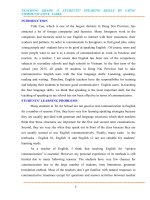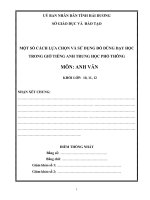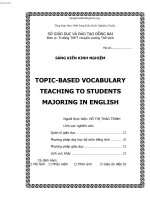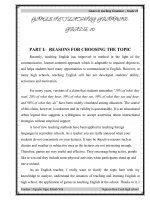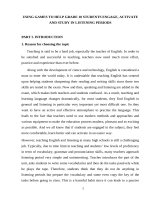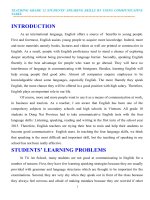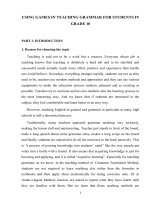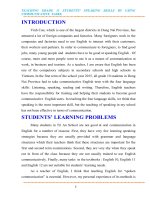skkn tiếng anh 12 TEACHING GRADE 12 STUDENTS’ SPEAKING SKILLS BY USING COMMUNICATIVE TASKS
Bạn đang xem bản rút gọn của tài liệu. Xem và tải ngay bản đầy đủ của tài liệu tại đây (162.13 KB, 16 trang )
TEACHING GRADE 12 STUDENTS’ SPEAKING SKILLS BY USING COMMUNICATIVE
TASKS.
INTRODUCTION
As an international language, English offers a source of benefits to young people.
First and foremost, English assists young people to acquire more knowledge. Indeed, more
and more materials namely books, lectures and videos as well are printed or constructive in
English. As a result, people with English proficiency tend to stand a chance of exploring
deeper anything without being prevented by language barrier. Secondly, speaking English
fluently is the best advantage for people who want to go abroad. They will have no
interference of language in communicating with foreigners. Besides, learning English will
help young people find good jobs. Almost all companies enquire employees to be
knowledgeable about some languages, especially English. The more fluently they speak
English, the more chance they will be offered in a good position with high salary. Therefore,
English plays an important role in our life.
Of course, more and more people want to use it as a means of communication at work,
in business and tourism. As a teacher, I am aware that English has been one of the
compulsory subjects in secondary schools and high schools in Vietnam. All grade 10
students in Dong Nai Province had to take communicative English tests with the four
language skills: Listening, speaking, reading and writing in the first term of the school year
2015. Therefore, English teachers are trying their best to train and help their students to
become good communicative English users. In teaching the four language skills, we think
that speaking is the most difficult and important skill, but the teaching of speaking in my
school has not been really effective.
STUDENTS’ LEARNING PROBLEMS
In Tri An School, many students are not good at communicating in English for a
number of reasons: First, they have few learning speaking strategies because they are usually
provided with grammar and language structures which are thought to be important for the
examinations. Second, they are very shy when they speak out in front of the class because
they always feel nervous and afraid of making mistakes because they are worried if other
1
TEACHING GRADE 12 STUDENTS’ SPEAKING SKILLS BY USING COMMUNICATIVE
TASKS.
people will laugh at them. Moreover, they have little chance of practicing speaking English.
Finally, many tasks in the textbooks: English 10, English 11 and English 12 are not suitable
for students’ learning needs. Some topics are not really close to daily life that is the reason
why students often find it difficult to express their opinion naturally.
As a teacher of English, I think that teaching English for communication is essential.
However, my personal experience of its methods is still limited due to the following reasons:
There are so many students in a class that just a few of them have chance for
communication; a period of forty five-mitute time is quite short, it prevents teachers from
teaching effectively; grammar translation is still a conventional method in teaching English;
Most of the teachers don’t get familiar with natural responses to communicative situations
except for questions and answer activities between teacher and students. Therefore, the
students are not confident enough to express themselves in English.
As a teacher, I really know that there are a lot of methods that can be applied in the
class in order to improve students’ speaking skill. In this research, I focus on grade 12
students’ speaking skill because I have applied this method to students in grade 10, 11 for
two years. I total agree that interaction is two-way communication and it based on real- life
situations that require communication. By using this method, my students have the
opportunity to communicate with each other in the target language. Therefore, teachers
should create a classroom environment for students to have real- life communication.
LITERATURE REVIEW
Everyone admits the importance of speaking, the goal of teaching speaking is to improve
students’ communicative skills. By this way, students can not only express their idea and
feelings but also learn how to follow the social rules appropriate in each communicative
situation.
Nunan (1991) wrote, "Success is measured in terms of the ability to carry out a
conversation in the (target) language." Therefore, if students do not learn how to speak or do
not get any opportunity to speak in the language classroom, they may then get frustrated and
2
TEACHING GRADE 12 STUDENTS’ SPEAKING SKILLS BY USING COMMUNICATIVE
TASKS.
lose interest in learning the language. Our
responsibility is to improve students’ four
language skills: Listening, speaking, reading and writing. I think speaking is the most
important skill for my students because the purpose of our English course is really to enable
our students to communicate effectively. In fact, if the appropriate communicative tasks or
activities are taught in the right way, speaking in class can be a lot of fun. The achievement
in learning speaking will increase students’ motivation.
In recent research, it is true that in a language class, it is necessary for the teacher to create a
positive classroom atmosphere so that he or she can encourage the students to communicate
with each other. By doing this, the students can express their ideas, feelings and opinions
without feeling afraid of making mistakes. Besides, the students can conduct communicative
tasks in an effective way. Many researchers emphasize the importance of teaching
conversations or role play to English language teaching.
Jack C. Richards emphasizes that communicative practice refers to activities where practice
in using language within a real communicative context is the focus, where real information is
exchanged, and where the language used is not totally predictable.
In agreement with Richards, Willis (1996) states that creating a low stress atmosphere and
using the language for real purposes are ways to get meaningful communication and through
interaction and students have the opportunity to acquire discourse skills. Willis also points
out that the essential conditions for effective language learning, such as exposure, use, and
motivation. In agreement with Willis, Nunan (1991) says that task-based learning views the
learning process as a set of communicative tasks that are directly linked to the curricular
goals they serve. He also stresses the crucial role of communicative tasks in task-based
teaching and learning. He says that task-based teaching involves an approach where
communicative tasks are particularly important because students need to be involved in
interactions in the classrooms and real life. As a result, this view changes the approach of
designing tasks to be developed in the classroom.
TASK MODIFICATION
3
TEACHING GRADE 12 STUDENTS’ SPEAKING SKILLS BY USING COMMUNICATIVE
TASKS.
Roger Nunn suggests that teachers must take into account the following criteria when
they design tasks and exercises for English learners or students. Let’s consider the areas:
Simulating "Real" Conversation
Classroom tasks are simulations and can only approximate real-life communication,
but real-life skills, such as adjusting to an interlocutor's contribution can be built in. Tasks
designed to practise interactive ability should be an appropriate task for students. They must
be able to imagine themselves in the situation.
Exchanging
An interactive task should require students to exchange information, opinions,
attitudes, but not for its own sake. There should be a real purpose; each participant should
need to find something out from the others in order to complete the task.
Comprehensible Input
The task should require the participants to make sure they fully understand what the
others tell them and to make themselves fully understood to the others. In this way, students
will need to adjust to each other's contributions.
Improvising
The task should require both predictable and unpredictable communication. Real
conversation always involves unpredictability so an ability to improvise needs to be
practised. For example, an attempt to come to an agreement is unpredictable. There is no
requirement to actually reach an agreement, so the participants may develop the conversation
freely. On the other hand, they must exchange the information for an agreement to be
possible and cannot easily avoid asking questions.
Mixed- Ability
For mixed-ability courses, tasks should favour the production of contributions of all
kinds. They should allow both weak and strong participants to extend themselves to their full
ability. For strong participants, making themselves understood to students with less linguistic
ability is a useful skill. Opportunity and time must be available for candidates.
4
TEACHING GRADE 12 STUDENTS’ SPEAKING SKILLS BY USING COMMUNICATIVE
TASKS.
(Roger Nunn - Kochi University, Japan)
In order to make the tasks more effective and relevant and appropriate for our students, I
often redesign the tasks to meet the students’ learning goals. Let’s have a look at the
following task design.
Part one: English 12 - Unit 2: Cultural Diversity (Page 23)
Task 2 (Task from the textbook)
Below are some typical features of American cultural. Work in pairs, discuss and
find out the corresponding features of Vietnamese culture.
Newly-designed Task
1.
Role- playing:
Instruction: Work in pairs to play roles in the dialogue. Change the roles
when you have finished.
Mary: Hi! Thao.
Thao: Good morning, Mary.
Mary: Well, what are you doing?
Thao: Oh, I am just looking the picture of my family. Do you want to see it?
Mary: Um, I’d love to. Who are they?
Thao: My grandparents, my parents and my brother and me.
Mary: I want to know something about the culture of vietnam. Would you mind
answering my questions?
Thao: Oh, no. Go ahead.
Mary: How many generations are there in a Vietnam family?
Thao: Well, two, three or even four generations live under one roof.
Mary: Oh, that’s really interesting. Who looks after their old- aged parents?
Thao: They are taken care by their sons.
5
TEACHING GRADE 12 STUDENTS’ SPEAKING SKILLS BY USING COMMUNICATIVE
TASKS.
Mary: Really? Is it polite to ask questions about age, marriage and income in
Vietnam?
Thao: Well, asking questions about age, marriage and income is accepted in Vietnam
Mary: That sounds surprising. When are groceries bought?
Thao: Uh, groceries are bought every day.
Mary: Which holidays are the most important in Vietnam?
Thao: Yeah, Tet or Lunar New Year is the most important in Vietnam.
Mary: It’s wonderful. I want to take part in this holiday.
Thao: Oh, I hope you are really interested in it. I feel excited when I talk to you.
Now, I have some things to do. Goodbye for now!
Mary: Bye. See you later.
Thao: Thank you.
2. Making questions:
Instruction: Work in pairs to make correct questions, using the word provided.
Then, ask your partner to answer the questions to make your own dialogue.
Generations
How many
Their old- aged parents
Who
Questions about age, marriage and income
Is it .......
Every day
When
Tet or Lunar New Year
Which
Rationale: Encouraging students to practise making dialogue is a very necessary strategy
in teaching spoken communication because it helps students get information from others. We
do this in order to motivate students to ask and answer about their real life.
Suggested Questions
Generations
their old- aged parents
How many generations are there in a Vietnam family?
Who looks after their old- aged parents?
6
TEACHING GRADE 12 STUDENTS’ SPEAKING SKILLS BY USING COMMUNICATIVE
TASKS.
questions about age, marriage and
income
Every day
Tet or Lunar New Year
Is it polite to ask questions about age, marriage and
income in Vietnam?
When are groceries bought?
Which holidays are the most important in Vietnam?
Part two: English 12 - Unit 10: Endangered Species (Page 110)
Task 2 (Task from the textbook)
Work in pairs. Look at the information about the giant panda, tiger, rhino and
elephant, which are endangered animals. Ask and answer questions about them.
Newly-designed Task
1.
Role- playing:
Instruction: Work in pairs to play roles in the dialogue. Change the roles
when you have finished.
Ngoc: Hi! Hang.
Hang: Hello, Ngoc.
Ngoc: Well, you look nice today.
Hang: Thank you. You are, too.
Ngoc: Can you tell me something about the elephants which are now in danger?
Hang: Certainly, they live in small areas of India, Sri Lanka, China and Southest Asia
and the Sahara desert in Africa.
Ngoc: What is the population of elephants in the world?
Hang: Well, It’s about 700.000.
Ngoc: Oh, that’s really surprising. What is their height and their weight?
Hang: Their average height is 1.2 m to 1.8 m. every elephant can weigh about 1000 to
3000 kg
Ngoc: What is their main food?
7
TEACHING GRADE 12 STUDENTS’ SPEAKING SKILLS BY USING COMMUNICATIVE
TASKS.
Hang: Well, they can eat grass, barks, roots, leaves or fruits.
Ngoc: That sounds interesting. How long can they live?
Hang: Uh, all of them are safe, so their life span can reach 60 years.
Ngoc: Why are they declining now?
Hang: Well, because some people are seriously destroying their habitat and hunting
them illegally, which makes them on the verge of extinction.
Ngoc: Well, sad to hear that. I hope in the future, people will be more aware of
protecting these animals.
Hang: Oh, I hope so, too. I am really interested in talking with you but I have some
things to do. Goodbye for now!
Ngoc: Bye. See you later.
Hang: Thank you.
2. Making questions:
Instruction: Work in pairs to make correct questions, using the word provided.
Then, ask your partner to answer the questions to make your own dialogue.
Habitat
Where
Population
What
Height and weight
What
Food
What
Life span
Reason for decline
How long
Why
Rationale: Encouraging students to practise making dialogue is a very necessary strategy
in teaching spoken communication because it helps students get information from others. We
do this in order to motivate students to ask and answer about their real life.
8
TEACHING GRADE 12 STUDENTS’ SPEAKING SKILLS BY USING COMMUNICATIVE
TASKS.
Suggested Questions
Habitat
Population
Height and weight
Food
Life span
Reason for decline
Where do elephants live?
What is the population of elephants in the world?
What is their height and their weight?
What is their main food?
How long can they live?
Why are they declining now?
Part three: English 12- Unit 11: Book (Page 122)
Task 4 (Task from the textbook)
Work in pairs. Ask and aanswer about the book you are reading or you have read.
Newly- designed Task
1.
Role- playing:
Instruction: Work in pairs to play roles in the dialogue. Change the roles
when you have finished.
Huyen: Good morning. What are you doing?
Thuy: Good morning. Well, I am reading a book.
Huyen: Are you interested in reading the books?
Thuy: Yes, of course. It’s very relaxing and knowledgeable.
Huyen: What sorts of books do you like to read?
Thuy: Oh, I love reading novels.
Huyen: What is the name of the book which you have just read?
Thuy: Well, I’ve read “The call of the wild”
Huyen: Who wrote that novel?
Thuy: A famous novel written by Jack London.
Huyen: Oh, I haven’t read it. Can you tell me something about that novel? Who
is the main character?
Thuy: The main character is “ Buck” – A brave ansd strong dog.
Huyen: What is the theme?
9
TEACHING GRADE 12 STUDENTS’ SPEAKING SKILLS BY USING COMMUNICATIVE
TASKS.
Thuy: Well, Buck was brought to the north area by some ugly hunters and had
to work as a good- puller.
Huyen: What’s then?
Thuy: Then, Buck met a generous man named John who saved his life.
However, Buck had left John and followed the call of the wild.
Huyen: Oh, it sounds attractive and meaningful.
Thuy: If you have time, read it.
Huyen: Sure. I hope we can love animals especiallydogs more and more
through novels like this.
Thuy: Oh, it’s too late. I have to go home. See you later.
Huyen: Bye. See you next time.
Rationale: Encouraging students to practise making dialogue is a very necessary strategy
in teaching spoken communication because it helps students get information from others. We
do this in order to motivate students to ask and answer about their real life.
2. Making questions:
Instruction: Work in pairs to make correct questions, using the word provided.
Then, ask your partner to answer the questions to make your own dialogue.
Reading books
Are you .............?
Novel
What
“The call of the wild”
What
Jack London
Who
The main character is “ Buck”
Buck was brought to the north area
by some ugly hunters and had to
work as a good- puller.
Who
What
Suggested Questions
10
TEACHING GRADE 12 STUDENTS’ SPEAKING SKILLS BY USING COMMUNICATIVE
TASKS.
Reading books
Novel
“The call of the wild”
Jack London
Are you interested in reading the books?
What sorts of books do you like to read?
What is the name of the book which you have just
read?
Who wrote that novel?
The main character is “ Buck” Who is the main character?
Buck was brought to the north area
What is the theme?
by some ugly hunters and had to
work as a good- puller.
Part four: English 12- Unit 14: International Organizations (Page 156)
Task 2 (Task from the textbook)
Below is some brief information about two international organizations. Work in pairs. Ask
and answer questions about them.
Newly- designed Task
1.
Role- playing:
Instruction:
Work in pairs to play roles in the dialogue. Change the roles when
you have finished.
Mai: Hello, Phuong. I’m preparing for my report about the UNICEF. Can you
give me some information about it?
Phuong: Oh, yes, of course. I’m very willing to help you.
Mai: When was UNICEF founded?
Phuong: It was founded in 1948.
Mai: What’s the date and the month?
Phuong: Ah, December 11th.
Mai: Where’s its headquater?
Phuong: Well, New York city.
Mai: Do you know who is the leader?
11
TEACHING GRADE 12 STUDENTS’ SPEAKING SKILLS BY USING COMMUNICATIVE
TASKS.
Phuong: Let me see. Oh, Anthony Lake.
Mai: Anthony Lake? Is he a American?
Phuong: Yes, you’re right.
Mai: What are the aims of UNICEF?
Phuong: Well, it’s an international organization to advocate for the protection
of children rights, to help meet their basic needs and help them reach their full
potential.
Mai: Can you tell me what are its main activities?
Phuong: Firstly, it has been providing supports and funds for the most
disadvantaged children, victims of wars, disasters and extreme the poverty. Secondly,
it carried out education development programmes for children.
Mai: Is this organization very developing?
Phuong: Yes, of course. It’s very developing in all over the world. Do you
need anything?
Mai: I think it’s enough for my good report. Thank you very much.
Phuong: You’re welcome. Bye.
Mai: Bye. See you soon.
Rationale: Encouraging students to practise making dialogue is a very necessary strategy
in teaching spoken communication because it helps students get information from others. We
do this in order to motivate students to ask and answer about their real life.
2. Making questions:
Instruction: Work in pairs to make correct questions, using the word provided.
Then, ask your partner to answer the questions to make your own dialogue.
In 1948
When
December 11th
What
New York city
Where
Anthony Lake
It’s an international organization to
Who
advocate for the protection of children rights
Firstly, it has been providing supports
and funds for the most disadvantaged children
12
What
What
TEACHING GRADE 12 STUDENTS’ SPEAKING SKILLS BY USING COMMUNICATIVE
TASKS.
Developing in all over the world
Is....................?
Suggested Questions
When was UNICEF founded?
In 1948
What’s the date and the month?
December 11th
Where’s its headquater?
New York city
Who is the leader?
Anthony Lake
It’s an international organization to What are the aims of UNICEF?
advocate for the protection of children rights.
Firstly, it has been providing supports What are its main activities?
and funds for the most disadvantaged children.
Is this organization very developing?
Developing in all over the world
* This is a table that shows about the confidence of students when practising the
dialogues before and after applying this method
12 A1(36 students)
Less confident
Confident
More confident
Before applying this
method
After applying this
method
17 students
9 students
10 students
8 students
11 students
17 students
12 A2 (33 students)
Less confident
Confident
More confident
Before applying this
method
After applying this
method
13 students
8 students
11 students
8 students
10 students
15 students
REFERENTIAL QUESTIONS
13
TEACHING GRADE 12 STUDENTS’ SPEAKING SKILLS BY USING COMMUNICATIVE
TASKS.
Besides using dialogues, I often make referential questions when I teach the four
language skills: Listening, speaking, reading and writing because using more referential
questions in the classroom will provide students with opportunities for real communication. I
also encourage my students to make referential questions so that they can exchange real
information in the class. As Nunan (1994) says: Referential questions are questions we ask
someone because we don't know the answer. In a language classroom, this can mean
questions that the teacher asks students and students ask each other. He also explains that
referential questions can be compared to display questions, for which the answer is already
clear and the teachers ask just to see if the students know the answer, or for language
manipulation. We should consider the following example :
English 12- Unit 15: Women in society - Speaking - Task 3 (Page 166)
Discuss whether you agree or disagree with the following statement and give explanations.
“Married women should not go to work.” (Referential question).
The students will have opportunities to express their opinions,
exchange real
information with each other by deciding on the most important cause. This means that I am
successful in helping them to produce real communication.
CONCLUSION
Teaching English speaking skill by making use of communicative tasks can be applied
in all classes in my school. Teachers design communicative tasks in order for students to
improve their speaking skill. As a result, students can feel like speaking English more.
Moreover, their pronunciation will be improved clearly. The more they practice, the better
and more condident they become in their pronunciation and vocabulary. As for students and
teacher’s perspectives to teaching and learning grammar, this approach to teaching speaking
will change their thinking that the teachers only make use of all exercises in the textbook
without any improvements, but it is the teacher’s job to design communicative tasks or
activities in order to help students to achieve their communication goals of learning and
teaching.
14
TEACHING GRADE 12 STUDENTS’ SPEAKING SKILLS BY USING COMMUNICATIVE
TASKS.
This is the third time I have written this research paper. I realize that my students are
more confident and they practice more naturally when they express their idea before class. I
really expect that the research will bring good results to me and other teachers in Tri An
High School. I strongly hope that communicative tasks in teaching speaking skills are
useful not only for students but also for teachers and my school.
Finally, I would be very thankful for any comments and suggestions regarding
possible improvements.
MẠCH THI THU NGA
REFERENCES
Brand, S.T. and Donato, J. M, (2001). Storytelling in Emergent Literacy: Fostering Multiple
Intelligences, Thomas Learning, USA.
Brown, H Dough. (1994). Teaching by Principles: An Interactive Approach to Language
Pedagogy. Prentice Hall Regents.
Harmer, J.(2001) The Practice of English Language Teaching, Pearson Education Ltd
15
TEACHING GRADE 12 STUDENTS’ SPEAKING SKILLS BY USING COMMUNICATIVE
TASKS.
Hubbard and Jones, P&H.(1983). A Training Course for TEFl, Oxford University Press.
Keppel, G. (1991).Design and analysis: A researcher’s handbook (3 rd ed ) Englewood
Cliffs, NJ: Prentice-Hall.
Larsen-Freeman, Diane. (1986).Techniques and Principles in Language Teaching, Oxford
University Press.
Littlewood , W. T. (1992). Teaching Oral Communication, Blackwell Publishers, UK
Roger Nunn - Kochi University (Japan)
Ur, P. (1996) A Course in Language Teaching: Practice and theory, Cambridge University
Press.
Willis, D. and J. Willis (2007)Doing Task-based Teaching, Oxford University Press.
Willis, J. (1996). A framework for task-based learning. London: Longman.
16

